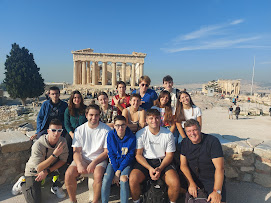
Dear
professor,
During our
shorts or lasting lives, everyone does something. Everyone grows, learns, and
gets to know things both in positive and negative ways. What I mean is that
during our lives, every day, we do many things, but then we die. Why does life
exist if it leads to nowhere? Everything we do in our lives, in the end, is
worth nothing. Maybe that’s what scares me when I hear the word “death”.
Sometimes I think about the fact that everything I do, won’t mean anything.
That’s true. Maybe we need to set our targets, I don’t know. Many people are
scared about death, thinking about the fact that it can happen any moment. They
say they want to do some precise things before dying; they don’t want to lose
some occurrences, etc. I don’t get it. When you will be dead, you won’t
remember loosing precise occurrences or something else! So I don’t understand,
why are we so attached to life?Gloria, IA
Dear
Gloria,
Internet is
filled with websites titled “100 places
to visit” or “100 things to do before
dying”, whose analytical content summarizes the authors’ idea about the
value of life and their explanations about its worthiness. They try to provide
a rapid guide to unlosable beauties and to life meaning activities. If you try
an images research, marvellous places we would never stop staring will come to
light. Maybe, we are a less stoic species than a Hollywood-style one, and we
need to archive in our memories some images and to write out some confidential
lists in which we put some very personal activities or some unavoidable objects
we would like to get. Maybe, you do remember the 21-year-old New Zealander girl, Vivian Waller, affected whit a lungs tumour. In January 2015, she edited a wish list containing the following targets: to get married, to celebrate her birthday and the one of her daughter, and finally to meet Robin Williams. The comprehensive and thoughtful actor sent her a video message. Or, Instead, the Dutch girl affected with a terminal illness who expressed her last wish to the Stiching Abulance Wens. She asked, “Take me to visit the Rijksmuseum Museum in Amsterdam”. When death approaches, we examine ourselves, like an actor who is going to be on the scene in a few minutes. He needs to organise the time he has left: he revises the scrip, he examines his dress, he look himself in the mirror just to convince himself everything’s okay. People need to coordinate their time before dying. Even if it is short, it is still an important part of their lives. It is not random that approaching to death we develop an attachment to it. We have a greater consciousness of what you leave. We feel a double defeat: the defeat of your body, which is knocking down, and the defeat of feeling all your projects dissolving. The cancellation of a life project or of a relationship is more painful than the cancellation of life itself. Accepting death is difficult, but it is less difficult if we have the time to realize ourselves in some ways. There are two ways to confront death: someone gets ready as a man of faith and trusts in God. Instead, someone else act as a stoic not requiring any more time to life and accepting his situation without regretting the past. Emperor Marcus Aurelius (II century BC) wrote in his “Remembers”: «This moment, you have to spend it as nature requires, leave quietly like the oil. Once reached its maturity, oils blesses, falling, the land that produced it and thanks the tree that generated it». But it is not easy to feel full of life. Moreover, like for example people affected with terminal diseases, not everyone is awarded with fair time less to mellow and bless the earth. Someone needs to say good-bye in other ways. You’re certainly right in saying there’s something irrational in some demands, mainly if supported by the idea that life consists in storing moments that are impossible to carry with us after life. Then why do we have this instinct of storing some events? The idea I made up is that what makes you accept the implosion of life it’s the sharing of its plenitude and that the real cure for a person confronting something absurd is not medicine, it is the meaning he or she gives to life. In Italy, there is a popular saying attributed to Goethe «see Naples and die», see something beautiful or live a significant experience. Then, “you can say good-bye, satisfied of the banquet of life”, as Lucretius said. Unfortunately, not everyone wakes up satisfied, but the beauty that is contemplated or the good that you receive allow you to more easily accept the disappearance. The eyes that can be closed have experienced the beauty of a work of art or of nature or enjoyed the good coming from a loving relationship. To contemplate Rembrandt’s work means to participate at the marvellous human adventure, which represents both complexity and fragility. And that is not because we can carry moments somewhere, but because of their fullness, which remember us we took part to the human undertaking, to the mystery of what human can perceive, even if he feel defeated. It is an adventure of our minds and not of the “bios”, that surrenders.
Best wishes,
Alberto



























Nessun commento:
Posta un commento